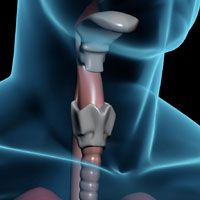Anti-PD-L1 Therapy May Have Benefit in Aggressive Papillary Thyroid Cancer
Patients with aggressive papillary thyroid cancer may be good candidates for treatment with anti–PD-(L)1 immunotherapy due to elevated levels of serum PD-L1, according to findings from a new study presented during the 2019 AACR-AHNS Head and Neck Cancer Conference.
thyroid cancer

Patients with aggressive papillary thyroid cancer (PTC) may be good candidates for treatment with antiPD-(L)1 immunotherapy due to elevated levels of serum PD-L1, according to findings from a new study presented during the 2019 Combined Otolaryngology Spring Meetings held in Austin, TX.
In a poster presentation, investigators from Louisiana State University Health Sciences Center, led by Lindsay Boven, MD, set out to determine if patients with aggressive PTC were candidates for antiPD-(L)1 agents and if aggressive PTC is linked with the presence ofBRAFV600E mutations. The investigators additionally looked at the association betweenBRAFV600E mutations and PD-L1 levels.
PTC accounts for 80% of all thyroid cancers and is typically associated with a good prognosis. Aside from radioactive iodine, which is the standard of care, there are limited treatment options available for the 5% of patients who have aggressive PTC and can become refractory to radioactive iodine treatment.
Treatment with the antiPD-1 agents nivolumab (Opdivo) and pembrolizumab (Keytruda) has demonstrated therapeutic effects especially in patients with melanoma. Similarly to PTC, approximately half of all patients with melanoma have aBRAFV600E mutation, which is typically associated with a poorer prognosis. Increased levels of PD-L1 are typically seen in patients with melanoma harboringBRAFV600E mutations.
In the study, investigators determined the serum PD-L1 levels in 38 benign, 30 normal, 11 aggressive, and 14 non-aggressive PTC samples using the enzyme-linked immunosorbent assay (ELISA). Testing for the presence ofBRAFV600E mutations was performed on 14 non-aggressive and 10 aggressive PTC samples using immunohistochemistry (IHC) on formalin-fixed paraffin-embedded tumor samples. PD-L1 levels were measured using polymerase chain reaction (PCR) in 13BRAFV600Epositive and 11BRAFV600Enegative PTC samples. Statistical significance was measured using analysis of variance (ANOVA).
Aggressive PTC in this study was defined as having one of the following features: extrathyroidal extension, an aggressive histology (tall cell, solid cell, columnar cell, and diffuse sclerosing variant), or distant metastases.
Significantly higher serum PD-L1 levels were seen in tumors with aggressive PTC compared with normal (P = .0001) and benign samples (P= .0001), and average levels in aggressive PTC samples were significantly higher than in non-aggressive thyroid cancers (P<.03). The average serum PD-L1 levels were not significantly different between non-aggressive PTC and normal (P= .96) or benign (P= .47) samples.
In addition, among 10 aggressive PTC samples and 14 non-aggressive PTC samples tested forBRAFV600E using both PCR and IHC methods, 54% of the cohort wasBRAFV600Epositive and 50% of aggressive PTC samples tested positive forBRAFV600E mutations. There was no significant correlation seen by either method between serum PD-L1 levels andBRAFmutations in the PTC samples (P= .139 for PCR andP= .83 for IHC).
“These data suggest that patients with aggressive PTC have elevated serum PD-L1 levels and those with unresectable or refractory disease could potentially benefit from antiPD-L1 immunotherapy. Both aggressive PTC and PD-L1 levels did not appear to correlate with the presence ofBRAFV600E. However, the role ofBRAFmutation as a prognostic marker is controversial,” the investigators wrote in their poster. They also suggested that intertumoral heterogeneity could contribute toBRAFmutational status.
Reference:
Boven L, Terhoeve S, Gundale A, et al. The Role of Anti-PD-L1 Immunotherapy in Aggressive Papillary Thyroid Carcinoma. Poster presented at: 2019 20AACR-AHNS Head and Neck Cancer Conference; Austin, TX; April 29-30, 2019. Abstract D018.https://www.researchposters.com/display_posters.aspx?code=COSM2019?rel=0?rel=0
Anticipating Novel Options for the RAI-Refractory DTC Armamentarium
May 15th 2023In season 4, episode 6 of Targeted Talks, Warren Swegal, MD, takes a multidisciplinary look at the RAI-refractory differentiated thyroid cancer treatment landscape, including the research behind 2 promising systemic therapy options.
Listen
No Improvement With Durvalumab vs Cetuximab in Advanced HNSCC
January 9th 2025The NRG-HN004 trial showed that durvalumab did not improve outcomes vs cetuximab in locoregionally advanced head and neck squamous cell carcinoma undergoing radiotherapy with contraindications to cisplatin, leading to early trial closure.
Read More